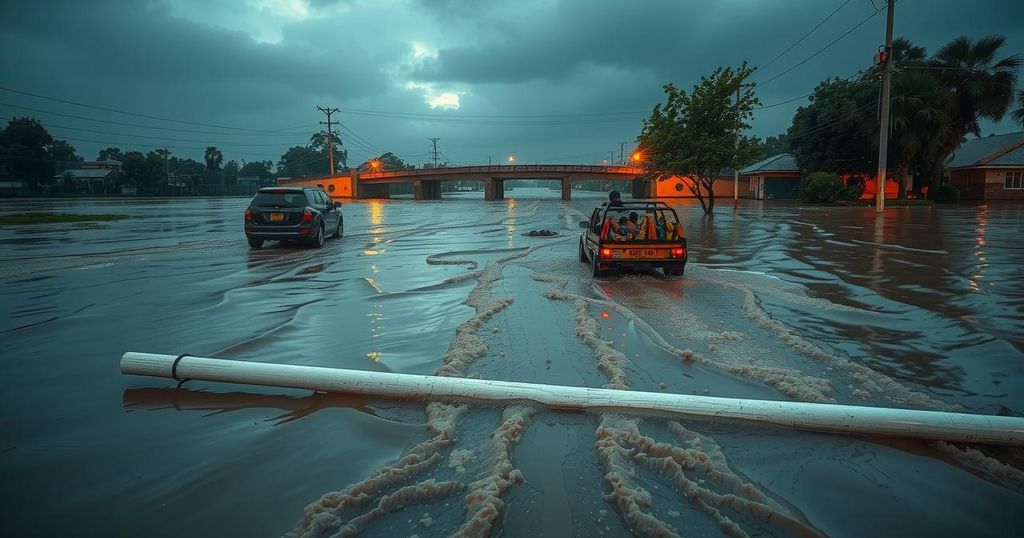South Sudan faces unprecedented flooding, displacing over 226,000 people and severely disrupting health services across 42 counties. The World Health Organization (WHO) is actively responding, providing critical medical supplies and support to combat rising health threats, including cholera and malaria, exacerbated by the floods. The health crisis is additionally intensified by the presence of nearly 800,000 refugees and returnees from Sudan, highlighting the urgent need for coordinated humanitarian response efforts.
Severe flooding in South Sudan has reached catastrophic levels, displacing over 226,000 individuals across the nation. This natural disaster has inundated homes, disrupted livelihoods, and submerged essential infrastructure, significantly impacting 42 out of the 78 counties. Current assessments reveal that 890,000 people have been affected by the extensive floods. The floods have not only affected physical structures but have also posed serious health risks, compromising access to medical care by rendering 58 health facilities inoperative and making an additional 90 facilities difficult to reach due to submerged roads, particularly those leading to the capital, Juba. The ongoing heavy rains, typical of South Sudan’s rainy season from April to November, have become increasingly severe due to climate change, intensifying community struggles and leading to permanent displacement in many areas. Additionally, the floods have exacerbated an already critical humanitarian situation, as South Sudan currently hosts nearly 800,000 refugees and returnees fleeing violence from neighboring Sudan. In light of this, health officials have reported a rise in cases of cholera and malaria, contributing to a heightened health crisis. “People are in a heightened state of vulnerability due to multiple shocks. WHO is committed to work with the Ministry of Health and our partners to ensure that they have access to essential health services continue while also prioritizing the response to growing humanitarian and health needs,” stated Dr. Humphrey Karamagi, WHO Representative in South Sudan. In response to the emergency, WHO has dispatched approximately 88 metric tons of emergency health kits across strategically prioritized locations such as Renk, Bentiu, Malakal, and Bor counties, which can cater to the health needs of over 870,000 individuals. WHO’s efforts include cholera and malaria response kits, snakebite treatment supplies, and ongoing surveillance of health impacts from the flooding, concentrating on vector-borne and water-borne diseases. The organization is collaborating with local authorities to implement emergency health responses and has completed a rapid needs assessment in Cueibet County to inform ongoing strategies. Moreover, WHO continues to support the establishment of climate-resilient health systems across the African continent, advocating for sustainable investments to bolster these systems against future climate shocks.
South Sudan is currently grappling with severe flooding, one of the worst in decades. This disaster is compounded by an existing humanitarian crisis, marked by the influx of refugees and returnees from neighboring Sudan due to armed conflict. The combination of climate change and a lack of infrastructure exacerbates the challenges faced by communities impacted by flooding. With health facilities compromised and the risk of disease outbreaks increasing, the situation demands immediate and coordinated health responses from global organizations such as the World Health Organization (WHO). The current health crisis is further complicated by vector-borne, water-borne diseases, and injuries, necessitating robust health interventions and emergency aid.
In summary, the severe flooding in South Sudan has resulted in significant humanitarian and health crises, affecting hundreds of thousands of individuals and disrupting essential health services across the country. The response from WHO and partners is crucial in addressing immediate health needs while advocating for long-term resilience strategies against climate change. Continued international support and local collaboration are vital for managing the ongoing crisis and protecting vulnerable communities from future threats.
Original Source: www.afro.who.int






